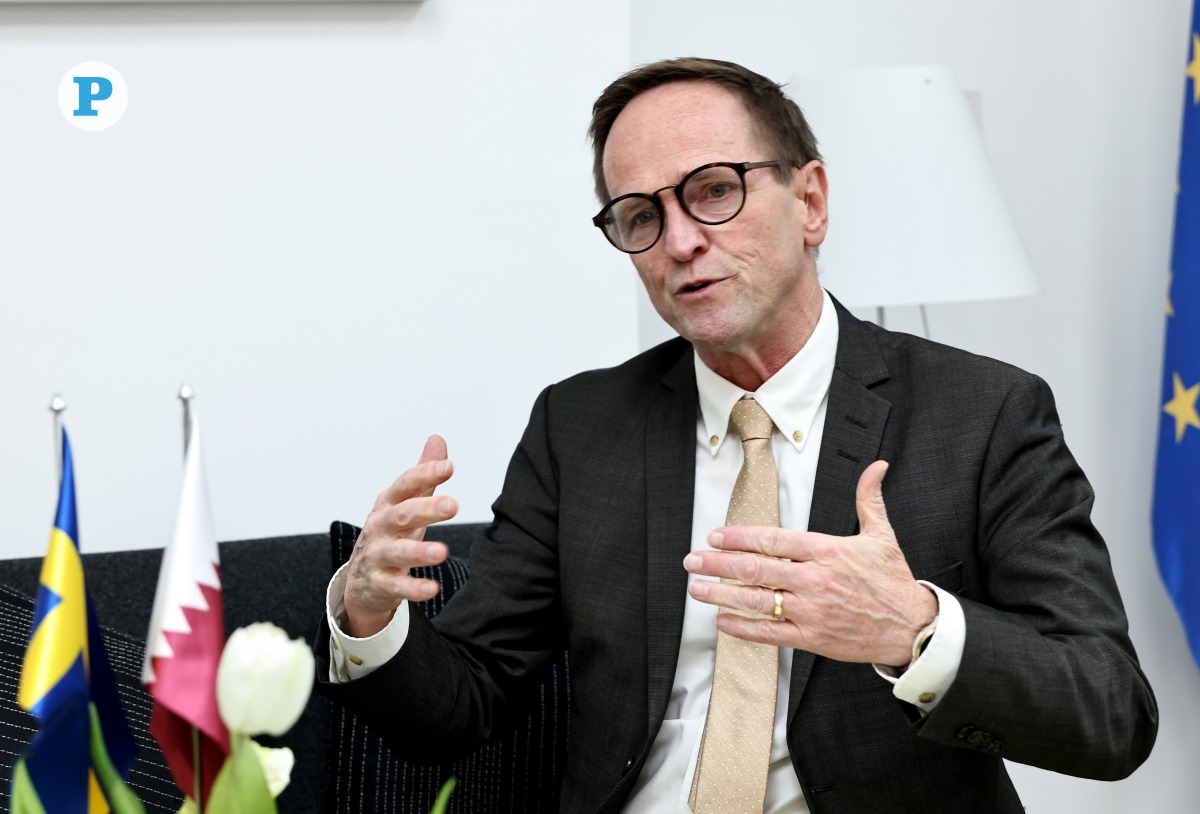
Secretary-General of Sweden’s Climate Policy Council Ola Alterå. Picture: Salim Matramkot / The Peninsula
Doha, Qatar: Qatar can play a significant role in bridging global efforts towards sustainable energy systems, said Secretary-General of Sweden’s Climate Policy Council Ola Alterå during his visit to Doha this week.
In an exclusive interview with The Peninsula, Alterå commended Qatar’s proactive stance on climate issues, describing the country as “small but globally active,” much like Sweden.
“Qatar is a mediator in many conflicts and contributes a lot in bridging differences. I think it could play a similar role in climate diplomacy by bridging efforts towards more sustainable energy systems,” he said.
He noted that Qatar’s National Climate Change Action Plan and increasing investment in renewable energy and sustainability reflect a growing commitment to global climate cooperation. “If Qatar can showcase to the world how renewable energies can work together with natural gas systems and perhaps integrate carbon storage, it would serve as a model for the world,” he added.
Alterå’s visit to Qatar includes meetings with the Minister of Environment and Climate Change, the chief negotiator for Qatar in UN climate talks, as well as think tanks including Qatar Foundation’s Earthna.
“I’m already learning a lot about the things going on in this region, and I hope to bring those insights back home,” he said, noting this was his first visit to Qatar though he had previously visited the region during the founding of the International Renewable Energy Agency (IRENA) in Abu Dhabi.
Emphasising the importance of international partnerships, Alterå said cooperation between Europe and the Middle East is crucial in accelerating the green transition. “We need each other. Europe has been very active in global climate negotiations, but this region has made impressive investments in research and what is beyond oil. That’s where we can meet and take the next steps together,” he said.

He highlighted several potential areas for Nordic–Gulf collaboration, including renewable electricity markets, waste-to-energy projects, and district cooling systems, where he said Qatar already has interesting initiatives that could benefit from Swedish expertise.
Explaining Sweden’s climate governance, Alterå outlined the role of the Climate Policy Council, an independent body established to ensure the government remains aligned with its climate law and targets.
“The council acts partly as a watchdog and partly as an advisor. We can’t take the government to court, but we can influence through analysis and cooperation with agencies and think tanks, even some in Qatar,” he said.
Sweden, which aims for net zero emissions by 2045, has made significant progress, achieving several milestones earlier and more cost-effectively than expected.
“Setting ambitious targets has proven beneficial to both our economy and competitiveness,” Alterå said. “It shows that innovation and people adapt faster than we think when the goals are clear.”
He also stressed that achieving such targets requires openness and collaboration, not isolation. “We have done this by working with our Nordic neighbours and other partners. You cannot do this alone,” he said.
On the policy front, Alterå pointed to heavy industries such as steelmaking and cement as key focus areas for future cooperation. “These hard-to-abate sectors are where the next big changes must happen,” he said, noting that Sweden’s progress in fossil-free steelmaking aligns with Qatar’s research into carbon capture and storage.
Reflecting on similarities between the two nations, Alterå remarked that both Sweden and Qatar have managed to build prosperity in harsh climates. “What took us more than a hundred years, Qatar has achieved in a few decades,” he said.
“While this has been driven by the fossil economy, it’s encouraging to see the country now striving to lead the next phase of the transition.”
Alterå also had a message for young people who are increasingly taking the lead in climate action. He said climate change is already reshaping the world and will affect everyone, especially in vulnerable regions.
“We already know much of what needs to be done and it’s exciting work. The technologies exist, but we need innovation to make systems connect. There will be many opportunities for this generation to make it happen and create something more sustainable for them and the next generation,” he said.
Alterå concluded on a hopeful note, “Some days, the situation can feel daunting, but change is happening on a large scale. That gives reason for optimism.”




